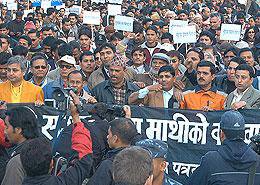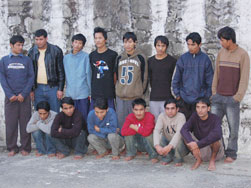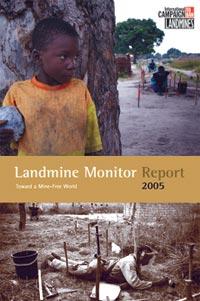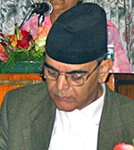'Ensure zero tolerance for violence against women'
Kathmandu, Nov 26- With the slogan: "Ensure zero tolerance for violence against women", a 16-day-long campaign began here Friday, marking the International Day for Elimination of Violence against Women (VAW).
The number of cases related to violence against women reported at the Women Police Cell in different parts of the country and released here by the Forum for Women, Law and Development (FWLD), Friday, suggests crime against women, especially domestic violence, is increasing by the year.
From a total of 569 reported cases of domestic violence in 2059/60, the number increased to 922 in 2060/61. There were 416 cases in 2055/56. Similarly, trafficking and child marriage has increased from the previous year.
Junko Sazaki, country representative of UNFPA, speaking at the launch of VAW in the capital Friday, doubted this figure saying that in a country where gender-based violence is sustained by a culture of silence and denial, the figures were unlikely to represent the actual number of domestic violence cases.
She said the toll on women and children is invariably heavy due to the conflict situation as also the fact that higher percentages of the displaced are also women.
"In Nepal, only vaginal penetration is seen as rape against women without looking into other forms of crimes such as trafficking, forced labor and organ replacement," said.
Mainwhile , 25 Commitments made by the government in international conferences on abolishing violence against women and promoting gender equality have been confined to paper works, said Sapana Pradhan Malla, president of Forum for Women, Law and Development (FWLD).
Speaking at a press meet organised in the capital today to mark the international day on ‘Violence Against Women,’ Malla underscored the need to introduce laws to discourage domestic violence. According to her, the legislative mechanism is weak and corrupt.
“We do not have adequate laws to address all forms of violence against women,” she said, adding that communal constraint is one of the major factors that is encouraging such violence.
Though the security budget has been increased significantly in the last couple of years, the increment has contributed very less in minimising violence against women, she said.
Gender equality is one step towards minimising the violence, she said. Though it has been underscored as an important indicator to meet Millennium Development Goals and to address other issues related to human rights, there has not been much progress, she said. Every year, the day ‘Violence Against Women’ is marked with over two-week-long programmes. “For the health of women, for the health of the world, no more violence” is the slogan of ‘Violence Against Women’ this year.
Same as The United Nations (UN) on Friday said that the UN is concerned over the increasing violence against women of all ethnic, caste and religious groups in rural areas due to the ongoing conflict.
A statement issued in the capital today on the occasion of 'International Day for the Elimination of Violence against Women' said, "there are credible reports of women dying in childbirth because they could not reach medical treatment and cases of rape, deliberate killing or maiming of girls and women that were not adequately investigated by the authorities."
The UN system in Nepal is committed to fight against all forms of discrimination and violence against women and girls, the statement read.
"Nepal has reiterated its commitment to reduce gender-based violence and the Constitution of Nepal also contains specific provisions to safeguard the rights and interests of women and children however many challenges still remain in their effective enforcement within the national legislation," the statement added.
In the news says A 25-year-old Indian woman, serving prison term in Birgunj Jail for drug trafficking, committed suicide this morning, police said. According to the police, Hakima Khatun of Ramgadhwa of eastern Champaran in Bihar, India, was found hanging from a tree branch by other inmates.According to the District Police Office, Parsa, Khatun used a nylon rope to hang herself in the tree inside the women’s cell.




